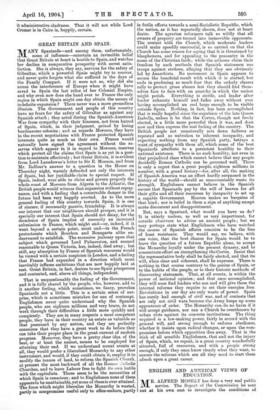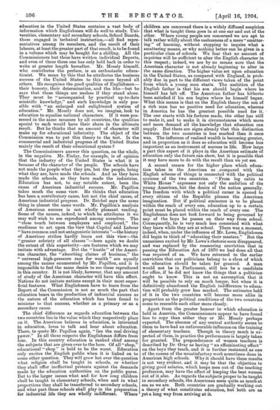education in the United States contains a vast body of
information which Englishmen will do well to study. Uni- versities, elementary and secondary schools, School Boards, those engaged in technical instruction,—all find repre- sentatives among its members, and the result of their labours, at least the greater part of that result, is to be found in a volume which may be bought for a shilling. All the Commissioners but three have written individual Reports, and even of these three one has only held back in order to write at greater length hereafter. Mr. Mosely himself, who contributes the preface, is an enthusiastic educa- tionist. We mean by this that he attributes the business success of the United States to this cause beyond all others. He recognises the good qualities of Englishmen— their honesty, their determination, and the like—but he says that these things are useless if they stand alone. They must be 'accompanied by practical up-to-date scientific knowledge," arid such knowledge is only pos- sible with "an enlarged and enlightened system of education." Mr. Monty does not, we imagine, look to education to equalise national characters. If it were pos- sessed in the same measure by all countries, the qualities special to each would have their share in the ultimate result. But he thinks that no amount of character will make up for educational inferiority, The object of the Commission was to put this theory to the test. Is the commercial and industrial progress of the United States mainly the result of their educational system ?
The Commissioners answer this question, on the whole, in the negative. Mr. Finley, for example, is of opinion that the industry of the United States is what it is because of the character of the people. The schools have not made the people what they are, but the people, being what they are, have made the schools. And as they have made the schools, so they have made the industries. Education has not, to any notable extent, been the cause of American industrial success. Mr. Papillon takes much the same view. He thinks that education has been a contributory cause, but not the chief cause, of American industrial progress. Dr. Reichel says the same thing in almost the same words. Mr. Papilion's analysis of American success is not wholly pleasant reading. Some of the causes, indeed, to which he attributes it we may well wish to see reproduced among ourselves. The "close touch between employers and employed," the readiness to act upon the view that Capital and Labour "have common and not antagonistic interests "—the history of American strikes hardly bears out this view—the "greater sobriety of all classes "—here again we doubt the extent of this superiority—are features which we may imitate with advantage. But the "hustle" of the Ameri- can character, the "absorbing claims of business," the "universal high-pressure race for wealth" are equally among the causes enumerated by Mr. Papillon, and it is impossible to feel the same desire to see these reproduced in this country. It is not likely, however, that any amount of study of the American character will have this effect. Nations do not imitate nations except in their most super- ficial features. What Englishmen have to learn from the Report of the Commission is not so much the part that education bears in the production of industrial success as the nature of the education which has been found to minister to that success, whether as a primary or as a secondary cause.
The chief difference as regards education between the two countries lies in the value which they respectively place on it. The American believes in education, is interested in education, loves to talk and hear about education. There, to quote Mr. Papillon again, "lies the real driving power." In all these respects the Englishman differs from him. In this country education is ranked chief among the subjects that are given over to the bore. Of all shop," educational " shop " is held to be the worst. Education only excites the English public when it is linked on to some other question. They will grow hot over the question what religion shall be taught in schools, or whether they shall offer ineffectual protests against the demands made by the education authorities on the public purse. But to the larger issues what and for how long children shall be taught in elementary schools, when and in what proportions they shall be transferred to secondary schools, and what part these schools shall play in the preparation for industrial life they are wholly indifferent. Where A second reason for the higher place which educa- tion takes in the American as compared with the English scheme of things is connected with the political systems of the two countries. "From log cabin to White House" expresses not only the ambition of the young American, but the desire of the nation generally. The freedom with which a political career is opened to every citizen of the Republic pleases the American imagination. But if political eminence is to be placed within the reach of every one, education up to a certain point must be placed within the reach of every one. The Englishman does not look forward to being governed by any of the boys he passes on their way from school. Consequently, he is very much less concerned with what they learn while they are at school. There was a moment, indeed, when, under the influence of Mr. Lowe, Englishmen did begin to think of "educating their masters." But the uneasiness excited by Mr. Lowe's rhetoric soon disappeared, and was replaced by the reassuring conviction that in passing the Education Act of .1870 we had done all that was required of us. We have returned to the earlier conviction that our politicians belong to a class of which the education should be taken for granted. A man would not be in Parliament, still less be a candidate for office, if he did not know the things that a politician ought to know. This is not an assumption that it will be possible to rely on much longer, but when it is definitively abandoned the English indifference to educa- tion will probably grow less marked. The estimates held of it in the two countries will become more alike in proportion as the political conditions of the two countries come to resemble each other more closely.
Apart from the greater honour in' which education is held in America, the Commissioners appear to have found less to copy than either they or Mr. Mosely perhaps expected. The absence of any central authority seems to them to have had an unfavourable influence on the training of elementary teachers. Though in theory much 113 ex- pected of them, in practice the performance is largely taken for granted. The preponderance of wojnen teachers is described by Dr. Gray as having "an effeminating effect" on the boys they teach, and it is further instanced as one of the causes of the unsatisfactory work sometimes done in American high schools. Why it should have these results is not very evident, and it may be that the objection to giving good salaries, which keeps men out of the teaching profession, may have the effect of keeping the best women out of it also. As regards the subjects proper to be taught in secondary schools, the Americans seem quite as much at sea as we are. Both countries are gradually working out a theory of what constitutes education, but both are as yet a long way from arriving at it.







































 Previous page
Previous page